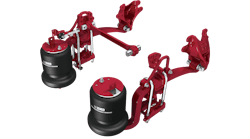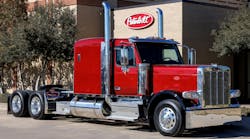During One of the worst economic crises to hit North America, one truck builder has delivered a strong vote of confidence in the future of the trucking industry. Daimler Trucks North America (DTNA) has opened its new $300 million Freightliner plant in Saltillo, Coahuila, Mexico.
The impressive 1.3 million-square-foot factory was unveiled to the public during a February 27 grand opening event. The new facility uses advanced lean manufacturing processes and techniques that incorporate continuous evaluation and improvement and best practices from other Daimler Trucks facilities and lean plants around the world.
“This wonderful new plant is the right investment at the right time in the right place with the right partners,” said Andreas Renschler, the head of Daimler Trucks and board member of Daimler AG. “Saltillo will be a showcase for our Global Excellence program. This project was planned and implemented through an extensive collaboration of the entire Daimler team — from Germany to the United States, and from Japan to Mexico. The result is an industry model for modern-day truck production worldwide. From Saltillo, we will not just export excellent trucks, but also the experience and expertise we've gained here.”
Mexico President Felipe Calderón Hinojosa praised DTNA for its vision in opening the new factory during a time of economic turmoil. “The economy will recover, and this new truck factory positions Daimler for the future,” he said. “This plant will make some of the most advanced truck products in the world, and Mexico is proud to be part of it.”
Coahuila Governor Humberto Moreira Valdéz, in welcoming DTNA to Saltillo, said, “This is one of the most important projects in the region. It strengthens Coahuila as a development and investments attraction center.”
Located in northern Mexico, the Saltillo plant will produce up to 30,000 Freightliner Cascadias annually, for sale in the US, Canadian, and Mexican markets. The Cascadia will be introduced to the domestic market in Mexico in late 2009.
With the opening of the new Saltillo factory, DTNA now has two heavy-truck factories in Mexico. The other in Santiago Tianguistenco — near Mexico City — produces Freightliner-branded heavy- and medium-duty trucks for domestic Mexico sales, as well as for export to Latin America, the United States, and Canada. Western Star will join the product mix at the Santiago Tianguistenco plant by July 2010.
Construction of the Saltillo plant started in January 2007, and the facility was completed 24 months later — on time and under budget. The facility is expected to employ 1,414 plant workers and 186 management and support personnel, and to generate an additional 1,100 jobs with local suppliers.
Built on a 740-acre site, the facility includes an administration building, a training center and auditorium, a 200,000-sq-ft logistics center, an 875,000-sq ft production facility, a pre-delivery inspection/transporter center, and test track. The plant was sited in Saltillo for significant logistical advantages including proximity to raw materials, suppliers, customers, roads, and rail.
“Locating this facility at Saltillo makes good business sense for our company,” said Roger Nielsen, DTNA chief operating officer. “We are confident of our ability to deliver the quality, cost, and reliability our customers expect from Daimler Trucks. Saltillo offers both the manufacturing flexibility and the space for future expansion that will enable DTNA to respond to any rebound in the truck market.”
Saltillo will set benchmark standards for Daimler Trucks manufacturing facilities worldwide, according to Mark Hernandez, plant manager. Lean operations at Saltillo are focused on getting it right the first time, and nowhere is that more evident than in the plant's goal of perfect first-time quality. In response to that challenge, Production hands off to Quality Control at the Customer Ready Center, not in an offline area as is typical in the industry.
“Offline is obsolete at Saltillo,” Hernandez said. “Problems are solved within assembly stations, not sent down the line. If a problem can't be solved, the line is stopped until the issue has been resolved.”
At the core of quality production for the Saltillo plant is Daimler's Truck Operating System (TOS), which contributes to both operational and everyday excellence and applies to every step on the production line. The system empowers each person at each workstation and provides an avenue for continuous feedback so the production process is always improving.
“This benchmarking process enabled us to select and build a new kind of workforce at Saltillo that is trainable, adaptable, and highly involved,” said Chris Patterson, DTNA president and chief executive officer. “The result is a culture at Saltillo that focuses on the problem and looks for ways to improve the TOS process while recognizing the value of employee initiative and insights. The Saltillo employee is the DTNA employee of the future.”
The Saltillo facility also reflects DTNA's focus on the environment, including a commitment to recycle 90% of all materials and a zero-waste/zero-landfill policy:
-
Integrated green areas on the site reduce soil erosion.
-
No petroleum-based fuel is used for rapid-charged electric tugger trains.
-
Recessed, solar-controlled windows decrease air-conditioning demands.
-
Apertures provide natural light in assembly areas.
-
On-site water treatment centers provide for 100% recycling of all process and sanitary water.








